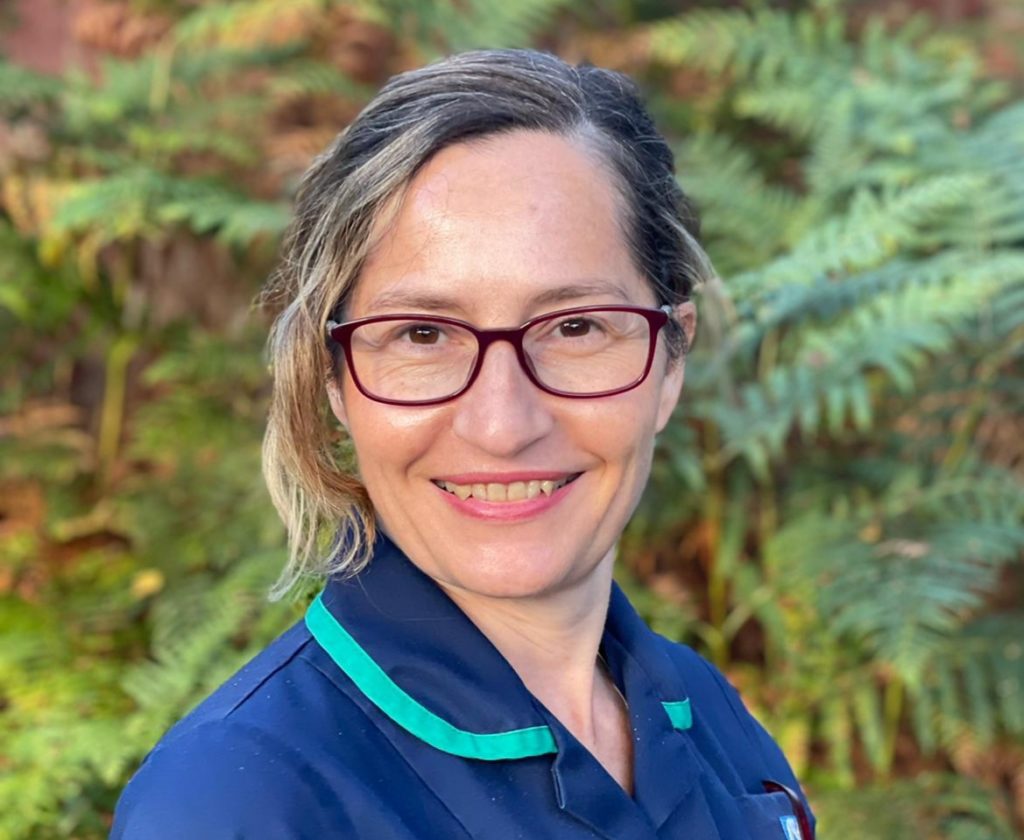The NIHR’s Your Path in Research campaign aims to encourage healthcare professionals to get involved in research or to further their career in research. Sheera Sutherland is a research nurse manager in the Oxford Kidney Unit. She completed an Oxford BRC preparatory fellowship in 2018 and is about to finish her PhD at Oxford Brookes University.

“We are interested in new technology or new drugs that will help our patients in the long term. We are lucky to be at the beginning of those new initiatives.”
Sheera has always worked in the Oxford Kidney Unit, at Oxford University Hospitals. Early in her career, an opportunity for a secondment as a research nurse arose. “It was initially for six months – and I haven’t looked back. It’s been a fascinating journey, working with doctors who are doing their own PhDs, which led me to consider doing a PhD myself.
Previously a haemodialysis research nurse, she currently manages a team of research nurses, who run several commercial and non-commercial studies, as well as overseeing smaller nurse-led projects supporting quality improvement.
She says her interest in research is “driven by improving our patients’ care and their wellbeing”.
“We are interested in what’s novel – new technology or new drugs – that will help our patients in the long term. We are lucky to be at the beginning of those new initiatives. It’s exciting, because we can learn things and develop things that are better by process.”
Sheera, who started her PhD in 2015, says: “I was working full-time and working for my thesis part-time. Doing the preparatory fellowship part-time for a year freed me up to go into Brookes two days a week to do the research I needed to do.”
Her PhD is on the development of a safe and feasible physical activity intervention for haemodialysis patients. She had completed the first stage – a qualitative study asking these patients what motivates them to do physical exercise, and what stops them – before applying for the fellowship.
“What the fellowship gave me was time to research and write the ethics for another study to follow up on what I’d done. I hadn’t had much time to do it in the two or three years prior to that. I was also able to study health economics and embed that into my proposal for the next phase of the study,” Sheera explains
“I wouldn’t be here now without the time the fellowship gave me. It helped massively to get me where I needed to be.” When she finished the fellowship, she was able to submit her ethics for the follow-up feasibility study.
This was based on the findings of the first stage – that haemodialysis patients wanted to exercise but were often too tired and needed guidance on how to exercise for short periods.
Sheera worked with the CLEAR Trust to develop a chair-based exercise programme based on a similar programme created by the BHF but modified to suit the specific needs of her kidney patients. She then conducted Stage 2 of her PhD – a feasibility study with 16 patient participants to see if the exercises work – and can be embedded – in the clinical environment.
But then COVID struck and Sheera was unable to see her patients face to face. She and her partners developed a video that patients could access remotely.
She finished her thesis in September 2020, had a viva – an oral test before a panel of examiners to defend your PhD thesis – earlier this year and is now finalising corrections.
Sheera’s project is now being embedded in regular face-to-face clinical work, with physiotherapists refining it to make it even more effective for patients and staff. But, as COVID has made clear, it is important to be able to access these chair-based exercises remotely, and Sheera is working with colleagues to incorporate more web-based tools.
“The PhD has been a long journey – about six years – and I’m near the end now. I have developed new skills as a researcher, and I’ve got to know important contacts, and had amazing support from my supervisory team, nurses, my matrons and consultants here. That’s half the battle – having the support of your clinical team while you’re engrossed in your research. They may not be directly involved, but they are there. I feel very lucky to have that support.”